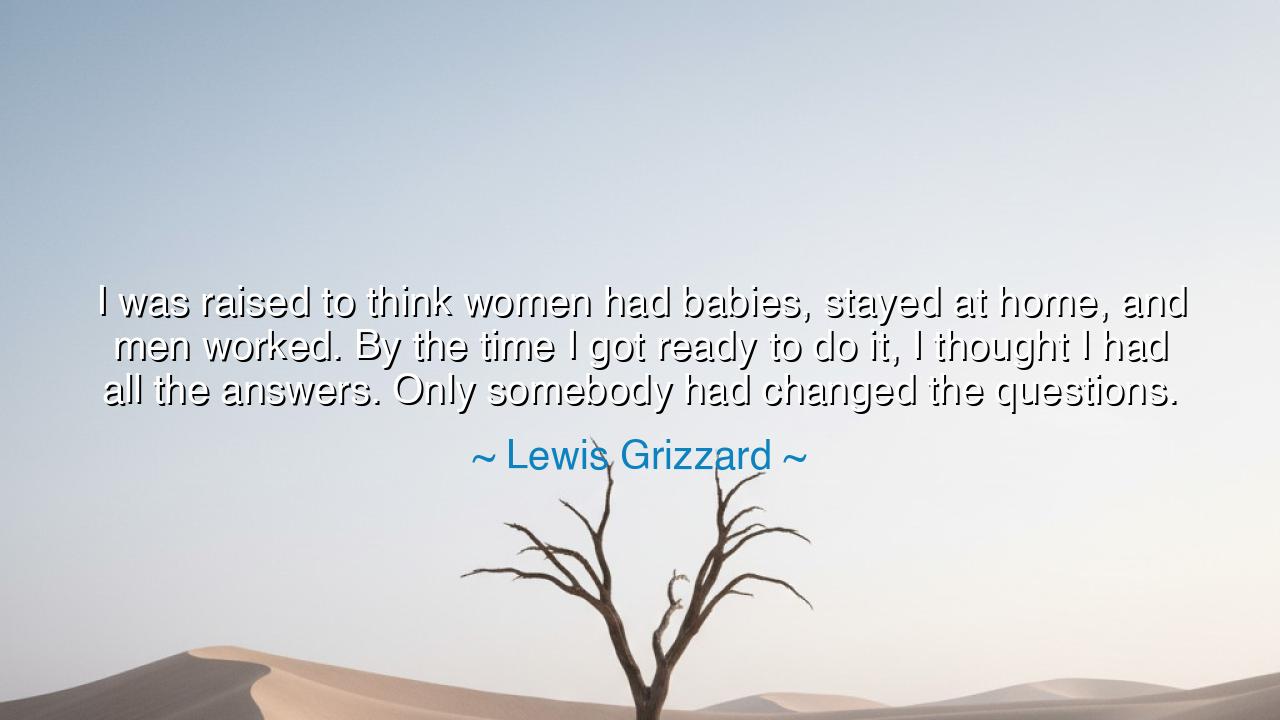
I was raised to think women had babies, stayed at home, and men
I was raised to think women had babies, stayed at home, and men worked. By the time I got ready to do it, I thought I had all the answers. Only somebody had changed the questions.






In the words of Lewis Grizzard, the humorist who clothed deep truths in laughter, we encounter a reflection both tender and profound: “I was raised to think women had babies, stayed at home, and men worked. By the time I got ready to do it, I thought I had all the answers. Only somebody had changed the questions.” Though framed with humor, this saying bears the weight of a generation’s reckoning — the awakening of a man shaped by one world who found himself living in another. Beneath the wit lies a meditation on change, identity, and the shifting nature of what it means to live rightly in one’s time.
Grizzard speaks not merely of gender roles, but of the great turning of history — that eternal rhythm in which each generation must unlearn the certainties of the last. He was a son of the American South, raised in a world where tradition seemed fixed as stone: men labored, women nurtured, and life followed patterns so familiar they seemed ordained. Yet when he came of age, he found that the world had turned beneath his feet. The old map no longer fit the new terrain. The roles, expectations, and rhythms of life had evolved — and the man who thought he understood his place was suddenly a stranger in his own age. His words remind us that wisdom is never static, and that what we believe to be permanent truths may be no more than passing customs.
This transformation was not his alone. The 20th century was an era of upheaval in which long-held traditions yielded to new understandings of equality and identity. Women, once confined by convention, rose to claim their rightful place in every sphere — in the workplace, in politics, in art, and in the home as partners rather than subordinates. Men, in turn, were called not only to provide, but to nurture; not only to lead, but to listen. To many, like Grizzard, this change was bewildering — for they had been taught one story, and now found themselves living in its sequel. But his humility in acknowledging that “somebody had changed the questions” is itself the mark of wisdom. For the truly wise do not cling to the answers of the past; they learn to ask new questions in the light of the present.
The ancients knew this truth well. The philosopher Heraclitus wrote, “No man ever steps in the same river twice, for it is not the same river and he is not the same man.” So it is with the currents of society and time. What once was clear becomes clouded, what once was certain becomes complex. The man or woman who seeks peace in life must therefore learn the art of adaptation — to let go of what no longer serves truth and embrace what brings balance and justice to the changing world. Grizzard’s quote, though humorous, captures that moment when an individual realizes that life demands not nostalgia, but evolution.
History offers many such examples of transformation. Consider John Stuart Mill, the philosopher of liberty, who was raised in a home of rigid utilitarian logic — taught by his father to think of humanity in cold calculations of reason. Yet through his friendship with Harriet Taylor, a woman of fierce intellect and spirit, Mill came to see that the heart and the mind must walk together, and that the dignity of women was inseparable from the progress of all humankind. The man who once believed he had “all the answers” discovered, through love and change, that he had not even understood the questions. Like Grizzard, he learned that wisdom does not reside in certainty, but in humility before life’s unfolding truths.
There is something heroic, even tender, in Grizzard’s admission. It is not easy to confess that the world has outgrown one’s certainties. Yet such honesty is the seed of renewal. The answers of one era are the questions of the next, and to live wisely is to walk with grace through that transition. The world that changes around us invites us to grow — to let the old assumptions die, not in bitterness, but in reverence for what they once meant. The man who resists change turns rigid and weary; the one who embraces it becomes timeless.
The lesson, then, is clear and enduring: do not cling to the answers of your youth when life demands new understanding. The traditions that shaped you are not prisons but stepping stones. Honor them, but do not let them bind your heart. As the world evolves, evolve with it — in compassion, in openness, in courage. In practice, this means listening before judging, learning before defending, and loving before fearing. Change is not the enemy of truth; it is the breath that keeps truth alive.
So remember the wisdom of Lewis Grizzard, who spoke through humor the deepest truth of human existence: that life will always rewrite its questions, and that wisdom is not in having all the answers, but in the willingness to seek them anew. The river of time flows on, carrying us forward whether we will or not. Let us not stand upon the banks, clinging to old certainties, but step boldly into its current — ready, not with answers, but with open hearts. For those who learn to change with grace become, in the end, eternal.






AAdministratorAdministrator
Welcome, honored guests. Please leave a comment, we will respond soon